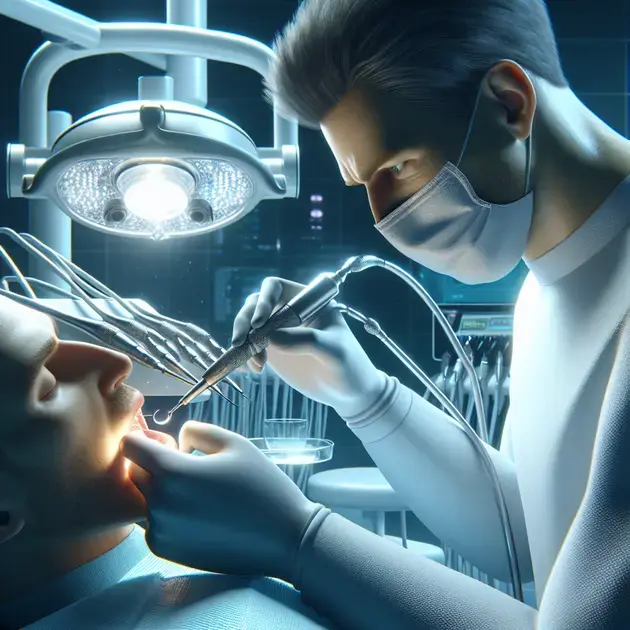If you’re looking for effective ways to eliminate dental plaque on teeth, you’ve come to the right place. Dental plaque is a common issue that can lead to various oral health problems if not properly addressed. By following the ultimate guide provided here, you’ll discover the best techniques and practices to keep your teeth clean and plaque-free.
With advancements in dental care and technology, there are now more options available for individuals to combat and prevent dental plaque buildup. This guide will cover not only traditional methods but also innovative approaches that can help you achieve optimal oral hygiene. Say goodbye to dental plaque and hello to a healthier smile!

Practices for Proper Dental Plaque Removal
Proper dental plaque removal is essential for maintaining good oral health. Here are some effective practices to help you remove plaque effectively:
1. Brushing Technique:
Brush your teeth at least twice a day using a soft-bristled toothbrush. Make sure to angle the bristles towards the gum line and use gentle circular motions. Consider using an electric toothbrush for more thorough cleaning.
2. Flossing Daily:
Flossing is crucial for removing plaque from areas that your toothbrush can’t reach. Use a gentle sawing motion to clean between teeth and along the gum line. Water flossers are also a great alternative for those who struggle with traditional flossing.
3. Mouthwash Rinse:
After brushing and flossing, rinse with an antiseptic mouthwash to help kill bacteria and reduce plaque buildup. Look for mouthwashes that contain fluoride for added protection against cavities.
4. Regular Dental Check-ups:
Visit your dentist every six months for professional cleanings and check-ups. Your dentist can identify any plaque buildup or early signs of gum disease and provide personalized recommendations for your oral hygiene routine.
5. Healthy Diet:
Maintaining a balanced diet low in sugary and acidic foods can help prevent plaque formation. Opt for crunchy fruits and vegetables like apples and carrots that can naturally clean your teeth while you chew.
Innovative Techniques for Fighting Plaque Buildup
To combat plaque buildup effectively, it’s essential to incorporate innovative techniques into your oral hygiene routine:
1. Oil Pulling:
Oil pulling involves swishing coconut oil in your mouth for about 15-20 minutes to reduce bacteria and plaque. This ancient practice can be easily done at home and is known for its natural cleansing properties.
2. Tongue Scraping:
Use a tongue scraper to remove bacteria and plaque buildup on the surface of your tongue. This simple technique can improve breath freshness and reduce the risk of plaque spreading to your teeth and gums.
3. Electric Toothbrush with AI Technology:
Invest in an electric toothbrush equipped with AI technology that tracks your brushing habits and provides real-time feedback. These innovative brushes can help you focus on areas with the most plaque buildup and improve your overall brushing technique.
4. Enzyme Toothpaste:
Consider using enzyme toothpaste containing proteolytic enzymes that break down plaque and tartar. These toothpastes can be a valuable addition to your oral care routine, especially if you’re prone to plaque buildup.
5. Laser Plaque Detection:
Visit a dentist who offers laser plaque detection services to identify hidden plaque and assess your oral health more accurately. This high-tech approach can help target areas with the most significant plaque accumulation for targeted treatment.
Achieving Optimal Oral Hygiene: The Ultimate Guide
To achieve optimal oral hygiene, follow these comprehensive steps to ensure your mouth stays healthy:
1. Establish a Consistent Routine:
Set a daily oral hygiene routine that includes brushing, flossing, and rinsing. Consistency is key to preventing plaque buildup and maintaining fresh breath.
2. Use Proper Oral Care Products:
Invest in quality toothpaste, toothbrushes, and floss that are recommended by dentists. The right tools can make a significant difference in your oral health.
3. Monitor Your Sugar Intake:
Limit sugary foods and drinks that can contribute to plaque formation and tooth decay. Opt for water as your primary beverage and choose snacks that are low in sugar.
4. Stay Hydrated:
Drink plenty of water throughout the day to wash away food particles and bacteria that can lead to plaque formation. Hydration is essential for overall oral health.
5. Educate Yourself:
Stay informed about the latest oral hygiene trends and techniques by reading reputable sources and consulting with your dentist regularly. Knowledge is power when it comes to maintaining optimal oral hygiene.

Effective Strategies for Plaque Prevention
Poor oral hygiene can lead to the accumulation of plaque on teeth, which can result in various oral health issues. To prevent plaque buildup and maintain good oral health, it is essential to follow effective strategies for plaque prevention.
1. Brushing your teeth at least twice a day with fluoride toothpaste is crucial for removing plaque, bacteria, and food particles from the surfaces of your teeth. Make sure to brush gently yet thoroughly to reach all areas of your mouth.
2. Flossing daily helps remove plaque and debris from between teeth and along the gumline, where toothbrushes may not reach effectively. Flossing also helps prevent tartar formation, which can lead to gum disease if not addressed.
3. Using an antimicrobial mouthwash can help reduce the amount of bacteria in your mouth, further preventing plaque buildup. Choose a mouthwash that is approved by dental professionals and incorporate it into your oral care routine.
4. Eating a balanced diet that is low in sugary and starchy foods can contribute to better oral health. Sugary foods can feed bacteria in the mouth, leading to increased plaque formation. Incorporate more fresh fruits and vegetables into your diet to support healthy teeth and gums.
5. Regular dental check-ups and cleanings are essential for plaque prevention. Dentists can identify early signs of plaque buildup and tartar formation, as well as provide professional cleaning to remove any hardened plaque from your teeth.
Understanding the Impact of Tartar on Dental Health
Tartar, also known as dental calculus, is a hardened form of plaque that forms on the teeth when plaque is not removed through proper oral hygiene practices. Tartar can have a significant impact on dental health if not addressed promptly.
1. Tartar buildup can lead to gum disease, as the hardened plaque irritates the gums and can cause inflammation and infection. This can result in symptoms such as gum tenderness, bleeding, and even tooth loss if left untreated.
2. The presence of tartar on teeth can also contribute to bad breath, as the bacteria in the hardened plaque release foul-smelling gases. Maintaining good oral hygiene practices is essential for preventing tartar buildup and reducing the risk of halitosis.
3. Tartar can make teeth appear yellow or discolored, affecting the aesthetic appeal of your smile. Professional dental cleanings are necessary to remove tartar and restore the natural whiteness of your teeth.
4. In advanced cases, tartar buildup can lead to periodontitis, a severe form of gum disease that can result in bone loss around the teeth. This can ultimately lead to tooth mobility and loss, emphasizing the importance of regular dental care to prevent tartar accumulation.
5. Understanding the impact of tartar on dental health highlights the importance of maintaining a consistent oral hygiene routine and seeking professional dental care to prevent and treat tartar buildup effectively.
Expert Tips for Maintaining a Healthy Smile
Maintaining a healthy smile involves more than just brushing and flossing regularly; it requires a comprehensive approach to oral care. Here are some expert tips to help you achieve and maintain a healthy smile:
1. Practice proper brushing technique by holding your toothbrush at a 45-degree angle to your gums and using gentle circular motions to clean all surfaces of your teeth. Brush for at least two minutes to ensure thorough cleaning.
2. Consider incorporating an electric toothbrush into your oral care routine, as they are often more effective at removing plaque and preventing tartar buildup compared to manual toothbrushes. Follow the manufacturer’s instructions for optimal use.
3. Limit your intake of sugary and acidic foods and beverages, as these can contribute to tooth decay and erosion. Instead, opt for water and dairy products that support healthy teeth, such as cheese and yogurt.
4. Avoid smoking and tobacco products, as they can stain teeth, contribute to bad breath, and increase the risk of oral cancer. Seek support and resources to quit smoking if you currently smoke.
5. Schedule regular dental check-ups and cleanings to monitor your oral health and address any issues early on. Your dentist can provide personalized recommendations to help you maintain a healthy smile for years to come.
Conclusion
Effective oral hygiene practices are vital for preventing plaque buildup and maintaining good dental health. By brushing your teeth at least twice a day with fluoride toothpaste, flossing daily, using antimicrobial mouthwash, and consuming a balanced diet low in sugary foods, you can reduce the risk of plaque formation. Regular dental check-ups and cleanings play a crucial role in early detection and removal of plaque and tartar, preventing potential gum diseases and maintaining a healthy smile.
Understanding the impact of tartar on dental health emphasizes the importance of addressing hardened plaque promptly. Tartar buildup can lead to gum disease, bad breath, teeth discoloration, and even more severe conditions like periodontitis if left untreated. Maintaining a consistent oral hygiene routine and seeking professional dental care are key in preventing and treating tartar accumulation effectively, preserving the natural whiteness of your teeth and overall dental health.
Expert tips for a healthy smile go beyond the basics of brushing and flossing. Practicing proper brushing techniques, considering electric toothbrushes, avoiding sugary and acidic foods, refraining from smoking, and scheduling regular dental check-ups are essential steps in achieving and maintaining optimal oral health. By following these expert tips and being proactive in your dental care, you can enjoy a healthy, bright smile for years to come.
